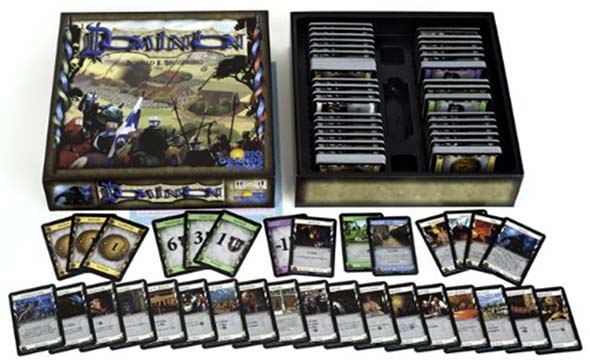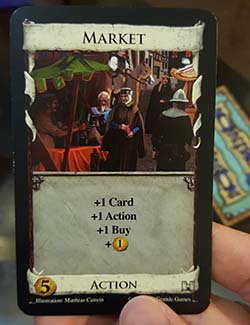
Dominion is a short and simple deck-building card game.
Most of the board games that I like are very long, epic games that take hours to play. Games like Civilization, Battlestar Galactica, and Eclipse can take four or five hours to complete - all of which can still be finished before I'm even done setting up Axis & Allies 1940!. But sometimes, my friends and I don't have hours to burn on a board game, and we need something shorter to play. Fortunately, I have a handful of shorter games as well. And one of the best and shortest games that I play is the deck-building game Dominion.
Dominion is an exceedingly simple game to learn, set up, and play. The basic concept is that each player spends money from his hand to buy kingdom cards to place in your deck. Each kingdom card has special abilities that you can execute when you play it from your hand, and the strategy of the game comes from which cards you buy and how you chain their effects together to maximize your ability to buy victory point cards. Each game will have a group of treasure cards and victory point cards, some of which are distributed to each player to form their starting hands. Each player receives seven "Copper" treasures and three "Estate" victory cards. Shuffle them, and draw five for your starting hand.

To play the game, simply follow the
directions printed on each card.
When your turn comes along, you can have an Action Phase and a Buy Phase. During the Action Phase, you play any "Action" cards from your hand and resolve their effects. During the Buy Phase, you play any treasure cards in your hand to purchase new cards to add to your deck. Each card has a cost to buy it, which is printed in the bottom corner. Certain cards will grant you additional actions or buys (i.e. the ability to split your treasure to purchase multiple cards of smaller value), and chaining them together efficiently is the key to victory.
There's very few actual rules to learn, since all the actions in the game are resolved by simply reading the effects from the card. The only things you have to learn are some of the game's basic vocabulary (e.g. "action", "buy", "gain", "discard", "trash", "attack", and so on). Once you know what all those words mean in relation to the game (and most of them are self-explanatory), you are ready to play! The result is a simple and elegant game that can be picked-up and played within a matter of minutes.
But this simple game also hides some serious depth and versatility...
[More]
e3fc1c69-8f70-4575-a4de-76f7f3fa93a5|0|.0
Tags:Dominion, Rio Grande Games, board game, card game, deck-building game, medieval, renaissance, kingdom, victory point, treasure, shuffle, card protectors, Donald X. Vaccarino

Recently, I brainstormed the possibility of redesigning Beyond Earth's winstates in order to support cooperative victories. With Civilization VI having been announced last month, I want to take some time to look at some different ways to approach victories in the mainstream Civilization games. Since Civilization III, there have been five victory types that have appeared in every mainstream Civ game:
- the military victory = kill or conquer everyone else
- the science victory = build a space ship to Alpha Centauri
- the culture victory = accumulate the most culture yield (usually through wonders)
- the diplomatic victory = vote for yourself to be leader of the United Nations
- the score victory = if no other victories are met by a certain number of turns, the civ with the highest score wins.
Earlier games had fewer victories (only military and space race), but there have been other victory types as well. Civ III and IV had a victory that simply required the player to occupy a majority of the map's land area and population (which could be achieved via military conquest and/or relatively peaceful expansion). I liked this victory type because it facilitated role-play by allowing me to grow my empire organically without having to feel like I was constantly meta-gaming for one of the other victories - just keep growing by whatever means are necessary or convenient. Civ IV also had a religious victory that required you to convert other players to your religion and then get them to elect you to be Pope or whatever. Civ: Revolution and the board game even included an economic victory in which you must accumulate a certain amount of wealth tokens. This was different than the "economic victory" of Civ V, in which you save up enough money to buy out the alliance of every city state on the turn before a U.N. election.
Civilization IV included a religious victory [LEFT], and the board game includes an economic victory [RIGHT].
These victories are intended to provide a direct path to victory using each of the major fundamental gameplay styles. But are there other methods?...
[More]
a7731900-5994-464b-bc32-bb3d6884e093|1|5.0
Tags:Sid Meier's Civilization, Civilization, Civilization V, Civilization VI, victory, military, science, culture, diplomacy, religion, high score, economy, peace, war, cooperation, humanism, humanist, alliance, ideology, space race, United Nations, world wonder, agenda, leaders, Theodore Roosevelt, board game, victory point, Ed Beach, Sean Bean, E3, Settlers of Catan, The Sims 2, Sid Meier's Civilization the Board Game